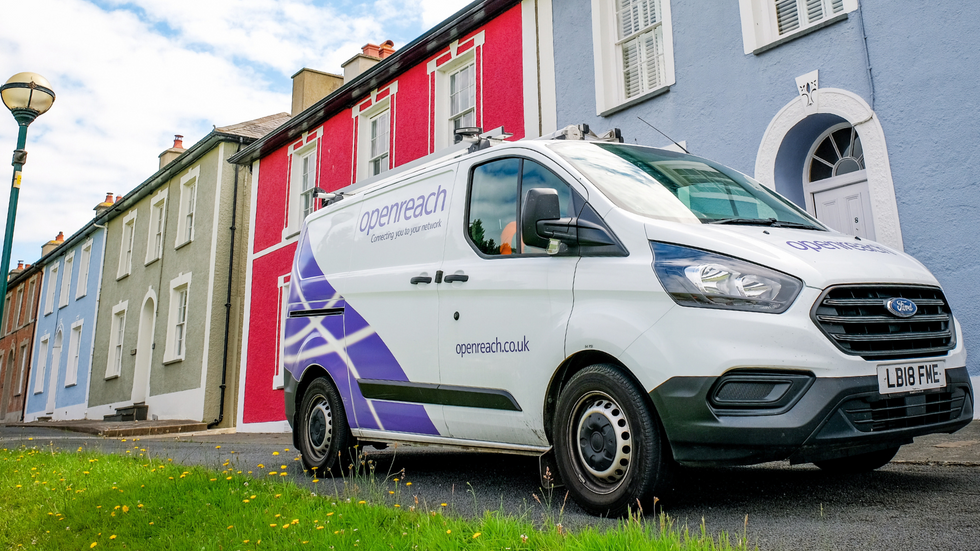Broadband speeds are increasing at a rate of knots across the UK at the moment, but does anyone actually need these ultra-fast downloads? We quizzed an industry expert to find out
GBN | GETTY IMAGES
Cutting through the marketing bluff to find out how fast your internet speed actually needs to be...
Don't Miss
Most Read
Trending on GB News
Broadband providers are in an arms race to unleash record new speeds across the UK. Virgin Media is bringing top speeds of 2Gbps — that’s almost 29x faster than the average household broadband speed — to almost one million homes soon, with BT-owned Openreach unlocking 1.8Gbps download speeds for brands like Sky, TalkTalk, and Plusnet in the coming months.
But with Netflix recommending just 5Mbps to watch its series and films in crisp High Definition (HD) quality ...should anyone be paying vast sums to their broadband provider for 400x that speed?
To find out, we spoke to broadband expert Sebastien Lahtinen, who serves Director at ThinkBroadband.com. Mr Lahtinen has over a decade of experience covering broadband and the industry as well as holding non-executive roles within internet interconnection companies.
So, should we rush to upgrade our connections to the latest, fastest — and most expensive — broadband speeds for the best experience? ...Not really, according to Mr Lahtinen.
“Broadband providers are racing to offer faster and faster services in a bid to appear to be the fastest provider — but it's not necessarily about getting more subscribers onto those fastest plans, but about perception of the provider being ahead of others,” Mr Lahtinen tells GB News.
“We've seen alt-nets, such as B4RN, offering 10Gbps home services — something there simply isn't a use-case for outside of very exceptional scenarios or early tech adopters who simply buy the best possible service, even at a significant price premium.”
Alt-net is an industry term for smaller broadband providers that operate their own networks. Many of these newer brands offer full-fibre internet connections to local areas not served by infrastructure from Virgin Media or BT’s Openreach, which is used by most nationwide brands.

Record-breaking download speeds can be a brilliant way for broadband companies to outdo one another... but does it really matter to you?
GETTY IMAGES
Faster broadband speeds can be a shortcut to more profit for broadband firms, Mr Lahtinen has revealed to GB News. He told us: “Some providers have told us faster packages don't necessarily see more use by customers — so they are a great way to increase margins.”
But if these eye-watering 1.5Gbps+ speeds are more about putting the boot into the competition and increasing margins, then what sort of bandwidth should GB News readers be paying for?
Understandably, this is not an easy question for ThinkBroadband.com’s Sebastien Lahtinen.
He admits: “What kind of broadband service you want is most definitely a 'how long is a piece of string' question”.
Nevertheless, he has a good rule of thumb for those looking to sign-up for a new contract:“For the average home user, downloads of 10Mbps and 2Mbps upstream per household member, including children, would allow everyone to watch video in High Definition (HD). Increasing that per person allowanceto 25Mbps would leteveryone at home watch in 4K Ultra HD.
“This means that a household of four people, including kids, would each be able to watch 4K content at the same time. Going up from 100Mbps to 200Mbps is well worth considering to have headroom, but beyond that it's simply a case of how convenient faster downloads could be.”
If your household isn’t that busy, you won’t need to pay for more than 100Mbps. Mr Lahtinen tells us: “Beyond 100Mbps, it's not about whether you can do a particular task — but how long you want to wait for it to complete.”
As for the ultra-fast speeds available from Virgin Media, EE, and smaller alt-nets like Hyperoptic, Community Fibre, and G.Network ...Mr Lahtinen doesn’t believe most people will find a use-case for these lightning-fast downloads.

It's best way to think about broadband speeds on a per-person allowance, Sebastien Lahtinen says, so you can guarantee everyone on the same Wi-Fi network can watch in the picture quality they want
GETTY IMAGES
“If you're a heavy user, then it's quite justifiable to have a 1Gbps connection for a household with many users. This can also avoid issues and slowdowns if one household member is doing something traffic-intensive. A student house with several users would be a good example of where a 1Gbps connection would be helpful to keep everyone happy whilst sharing a connection.
“Beyond 1Gbps, we just don't see the applications that would make use of faster speeds for the vast majority of users,” he admits.
Depending on the broadband suppliers available at your postcode and the deals currently on offer, signing up for a faster broadband package might not cost you much more each month. Mr Lahtinen adds: “It's worth noting that with some providers, the cost difference to upgrade may not be huge so you should always look at the extra cost and benefits, rather than living by a hard and fast rule.
“In the end the balance is about what matters most to you.”
Finding the right broadband package for you isn’t just about choosing the right download speed, since there are a several other factors that will impact your experience online at home.
 Openreach, which is owned and operated by BT, plans to build-out its full-fibre network to 25 million homes by December 2026 OPENREACH PRESS OFFICE
Openreach, which is owned and operated by BT, plans to build-out its full-fibre network to 25 million homes by December 2026 OPENREACH PRESS OFFICE “It's not just about download speed. It's worth considering what the upload speed is,” Mr Lahtinen points out. “This is not something providers advertise as readily — and for consumer connections has often been a fraction of the download speed.
“If you want to stream video or otherwise upload a lot of content, symmetric speeds (where download matches upload) can be more important than the raw download speed, or even just a package that has a sufficient upload speed to meet your needs.
“If you're an online gamer, even more important than raw speed is the latency. This is the time it takes for a packet of data to go from your computer to a server, and back again. If you're playing an interactive game where timing is everything — a high latency connection or one where latency varies a lot, sometimes referred to as 'jitter', can be far more challenging than a slower connection.”
LATEST DEVELOPMENTS
- Apple releases pivotal iPhone update to comply with EU law
- Freeview users will unlock a new channel at the same time as Sky TV viewers
- WhatsApp will block screenshots in certain parts of its app with next update
- Windows 10 users facing new charges from Microsoft get lifeline from Google
Full-fibre internet connections offer faster upload speeds as well as downloads. If your address hasn’t been upgraded to a fibre connection, you could be stuck with slower speeds.
BT-owned Openreach recently confirmed that it had reached the halfway mark in its ongoing plan to upgrade 25 million homes and premises by December 2026 at a cost of £15 billion. The scheme is part of the UK Government’s ambition to make Gigabit-capable broadband — meaning download speeds of 1,000Mbps or 1Gbps and higher — available to more than 85% of the UK.
And even if you’ve got the perfect connection with the ideal balance between download and upload speeds for your home, a bad Wi-Fi network can scupper all that hard work, Mr Lahtinen tells us.
He cautions: “It's also worth noting that Wi-Fi networks which many devices in the home use to connect wirelessly, won't deliver the fastest possible speeds a lot of the time, so the extra capacity may be wasted.”
GB News recently spoke to the broadband team at EE, which offers some of the fastest broadband speeds nationwide, to determine the best placement for your Wi-Fi router to prevent wireless signals from being disrupted on their way to your devices.








